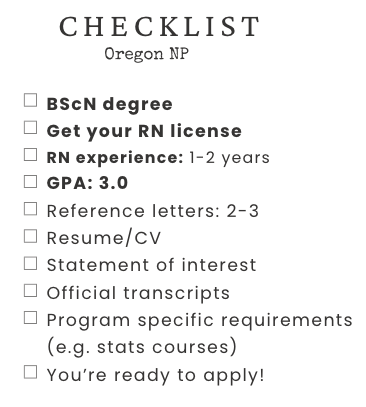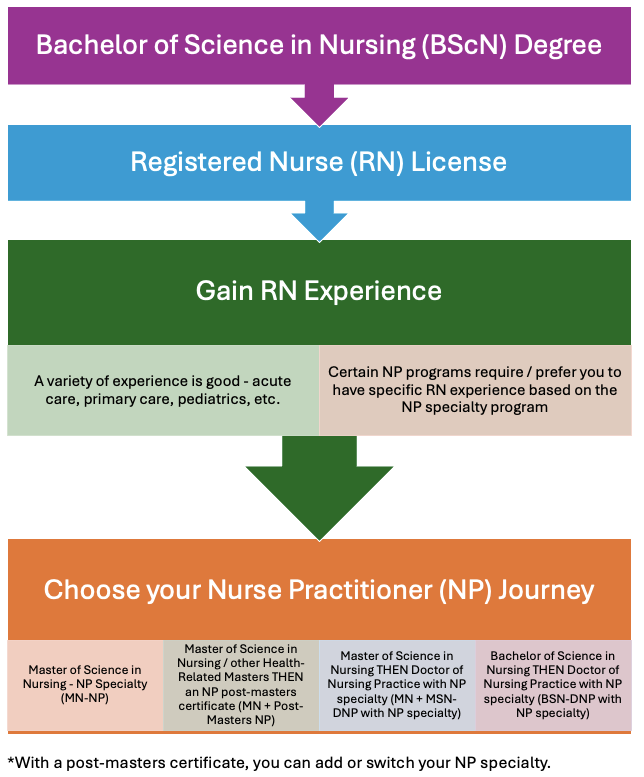Nurse Practitioner/APRN Programs in Oregon
The path to becoming a nurse practitioner will be unique to you. For those of you thinking of pursing a career as an NP, I hope to provide some guidance. If you want a general overview on how to become an NP in the U.S., I suggest you read this post. If you plan on pursuing an NP career in Oregon, then read on!
First, let’s define some terms:
BSN: bachelor's of nursing science (undergraduate degree)
MSN: masters of nursing science (masters graduate degree)
MN-NP: combined maters + nurse practitioner degree (masters graduate degree)
DNP: doctor of nursing science (some schools offer with an NP specialty) (doctoral graduate degree)
Post-masters certification: an additional certification (like an NP speciality) someone gets after completing a masters of nursing degree
Recap: How to Become a Nurse Practitioner (NP) in the US
If you’re thinking of becoming an NP, I highly recommend this read to get you prepared.
You can also join the NP reasoning community to get your NP learning kick-started - LEARN MORE.
What Nurse Practitioner Programs are offered in Oregon
There are 3 common streams:
Post-masters NP
Bachelor of Science in Nursing to Doctor of Nursing Practice (BSN-DNP) with an NP specialty
Masters of Science in Nursing to Doctor of Nursing Practice (MSN-DNP) with an NP specialty
Let’s break these down:
Post-masters programs: you require a master’s degree in nursing to apply for a post-masters program. Programs focus on core NP courses to prepare you to become an NP.
BSN-DNP with an NP specialty: This is an advanced, doctoral-level nursing program for Registered Nurses (RNs) with a Bachelor of Science in Nursing (BSN) who want to become a specialized Nurse Practitioner (NP). These programs are typically longer e.g. 3-4 years.
MSN-DNP with an NP specialty: This is an advanced, doctoral-level nursing program for Registered Nurses (RNs) with a Master of Science in Nursing (MSN) who want to become a specialized Nurse Practitioner (NP). These programs are typically longer e.g. 3-4 years.
When applying to a nurse practitioner program, you’ll need to choose a specific specialty to focus on. Many programs also require applicants to have prior RN experience. For instance, if you’re interested in adult-gerontology acute care, most schools expect 1–2 years of RN experience in an acute care setting, such as the ICU. Here is an overview of NP specialties to choose from.
Common Nurse Practitioner (NP) Specialties in Oregon:
Family (FNP): Provides primary care for patients of all ages. FNPs can diagnose, treat, prescribe medications, and manage acute and chronic conditions. They emphasize health promotion, disease prevention, and patient education. In many U.S. states, FNPs practice independently, increasing access to care in both urban and rural settings.
Adult gerontology acute care (AGACNP): Specializes in the care of adults and older adults with acute, complex, or critical conditions. AGACNPs work in hospitals, ICUs, trauma centers, and specialty clinics, where they diagnose, treat, and manage unstable or severe illnesses and injuries. Their focus is on short-term, high-intensity care, often in collaboration with multidisciplinary teams.
Nurse-midwifery: Specializes in pregnancy, childbirth, and postpartum care. CNMs provide gynecologic and reproductive health services like WHNPs, but also attend births, manage labor and delivery, and provide newborn care.
Pediatric: Provides ongoing primary care for infants, children, and adolescents. PPCNPs focus on health promotion, disease prevention, well-child exams, vaccinations, and management of common childhood illnesses. They build long-term relationships with families, supporting growth, development, and overall wellness in outpatient and community settings.
Psych/mental health (PMHNP): Provides ongoing primary care for infants, children, and adolescents. PPCNPs focus on health promotion, disease prevention, well-child exams, vaccinations, and management of common childhood illnesses. They build long-term relationships with families, supporting growth, development, and overall wellness in outpatient and community settings.
Want to kick-start your NP journey? NP Reasoning curates the top guideline updates, clinical approaches & diagnostic pearls to help you make confident decisions with your patients.
Sign me up!
Nurse Practitioner (NP) Schools in Oregon
There are 3 primary universities that offer NP programs - here is a quick snapshot of all the programs offered by University:
If you want to check out a document I compiled with up to date information on each program + links to each program embedded click the button below:
Online Nurse Practitioner (NP) Programs in Oregon
Western University of Health Sciences offers both BSN-DNP (family, psych/mental health) and post-masters (family/psych mental health) mainly online, with on-campus intensives periodically. There are several other online programs offered across the United States. For more information about online programs in different states, check out this page.
Nurse Practitioner (NP) Program Pre-Requisites in Oregon
Most schools in Oregon require the following pre-requisites:
A minimum GPA of 3.0 * some schools require a higher GPA - refer to the table above.
RN experience: 1-2 years (some do not specify number of hours); many programs require specific RN experience depending on the speciality you are applying to - especially acute care specialties.
BScN: for masters programs or BSN-DNP programs
MSN: for post-certificate/post-masters programs or MSN-DNP programs
For admission, most NP programs in Oregon require you to have a BScN degree, RN registration, a GPA of 3.0, and many prefer a minimum of 1-2 years related RN experience.
Can I work while I’m completing the NP program?
This depends on many factors. One should weigh personal responsibilities, work-life balance, completing the program full-time versus part-time. In general, it’s possible to work while enrolled in the program, but this is up to your comfort level. Personally, I completed a full-time post-masters NP certificate and did not work. The course content, paired with clinical rotations were very intensive, and I was able to immerse myself in the program and get the most out of it. That being said, circumstances differ, and you need to do what works best for you. It’s important to highlight that regardless of the program, it is a steep learning curve and lots of the learning is self directed. If you are seriously considering this next step in your career, our post on how to prepare for NP school will be helpful.
Where can I work as a Nurse Practitioner in Oregon?
Outpatient / primary care clinics — many NP roles are in family practice or general primary care.
Hospital-affiliated clinics, or community hospital practices serving both outpatient and sometimes inpatient needs.
Rural health clinics / small communities — for example coastal areas or towns outside metro centers.
Urgent care centers.
Psychiatry / mental health settings.
Occupational health – e.g. companies or large health systems hiring NPs to manage worker health, preventive care etc.
Academic medical centers and teaching hospitals — roles that may include clinical care + education / research elements. Example: Oregon Health & Science University (OHSU).
Home-based medicine & telehealth / hybrid roles. Some listings include home-visits and remote patient management.
Oregon NP Scope of Practice (Full Practice State)
Oregon is a full practice authority state for NPs. That means NPs can evaluate patients; diagnose, order, and interpret diagnostic tests; initiate and manage treatments; prescribe medications, including controlled substances; and in many cases run their own practices.
The Oregon Board of Nursing (OSBN) licenses NPs (among other APRNs) and grants prescriptive privileges consistent with the NP’s specialty, competency, and state law.
NP scope includes the full process of patient care: assessment, diagnosis, planning, intervention, and evaluation.
NPs in Oregon can admit patients to hospitals / health services (home health, hospice, long-term care) and manage both acute and chronic health conditions.
“Population foci” apply: NPs must practice within the population focus for which they were educated and certified (e.g., family, adult/gerontological, pediatrics, psychiatric/mental health, etc.). Expanding into other foci usually requires additional credentials or demonstrated competency.
Oregon law requires registration with the state’s Prescription Drug Monitoring Program (PDMP) if the NP has a DEA number.
NPs may also dispense some medications directly (short-term dispensing without separate dispensing license up to 72 hours) under specified rules.
Key Take home Points:
Do your research on NP programs.
Don’t hesitate to reach out to university admissions offices to ask questions about the program or admission process.
Talk with nurse practitioners who have been through this process already.
Think about what you want out of your career (Do you want a serious challenge with career growth potential?)
The NP program (and career in general!) is intense and will probably be the steepest learning curve of your life. Don’t let this intimidate you – check out our newsletter to kick-start your NP journey.
Join NP Reasoning Masterclass for a practical, curated educational experience for the busy NP.
Disclaimer - The views expressed in this post are my own and do not represent the official position of any organization. This is not a sponsored post.
Related Posts
How Do I Become a Nurse Practitioner in Canada?
How Do I Become a Nurse Practitioner In the U.S.?
How Do I Become a Nurse Practitioner: Getting my License?
How Do I Study for my Nurse Practitioner Certification Exam?
Should I Become a Nurse Practitioner?




